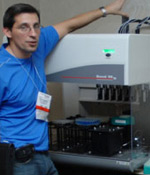Good Liquid Handling and Pipetting, Automated Sample Prep and Detection – Hands-on Workshop

& William Herms
Automation Trainer, LLC
Length: 2 Day Course
Date: Wednesday / Thursday, March 8 & 9
Fee: $1100 ($1500 after 2/18/17)
Be sure to check out Petar’s other Short Course:
Target Audience
This course is meant for managers and users of pipetting, readers, and laboratory automated equipment such as Researchers, Forensics and Clinical techs, Chemists, Sample Preparers, Biologists, Product Developers , Service/Application Engineers, , QA/QC users, Lab techs & managers, Sales Reps. Users planning to purchase liquid handling or detection equipment.
Course Description
Please bring laptop computer. Compliance, Regulations, Standards, Policies, Validation, Quality Assurance (QA), Quality Control (QC), Optimization, Best Practices, Business processes, and more for Bioprocessing, High Throughput Screening, Assay Development, Drug Discovery and Development, DNA and Protein Analysis, Biomarkers, Sample Preparation, Testing, and many more life science applications. This course is well suited for the laboratories conducting sample preparation and detection technology for clinical studies, forensics, research, and preparation for production. Proper training and knowledge in the use of automated liquid handling equipment is necessary for research and discovery. Preparing and processing your sample biologics or chemistries with automated equipment, requires skill, technique, and hands-on experience of a laboratory’s liquid handling equipment. If conducting research studies, clinical trials, drug discovery, or developing a product, the understanding of the physical concepts, the operation, and the processing of samples with laboratory automated liquid handlers is critical for maintaining compliances, following or developing standard operating procedures or protocols, producing quality results, maintain quality control, optimizing processing, and following industry standards and best practices that may satisfy Good Laboratory Practices (GLP), Good Manufacturing Practices (GMP), Safety, and/or regulatory requirements. Knowing which automated liquid handler meets your needs with a fitting detection technology for calibrating and qualifying your results requires becoming familiar with the terminology, capabilities and common uses. This workshop course will introduce you to the technology, terminology and capabilities while allowing you hands on experience on actual automated liquid and detection technology to help you understand your results in your delivery realm. The course will also review ISO and NIST. HOW YOU WILL BENEFIT • Master the terminology & methods automated liquid handling • Practice optimal pipetting techniques • Understand reagent & chemical compatibility issues • Become familiar with validation/QC testing techniques & options • Learn proper decontamination techniques • Operate real liquid handling robots with liquids of various sample types and handling characteristics.

[…] By Dr. Pete Conn […]